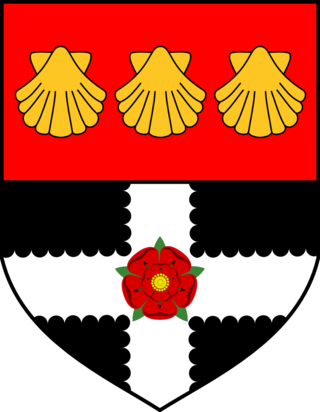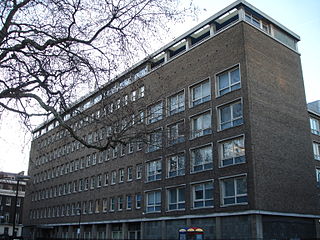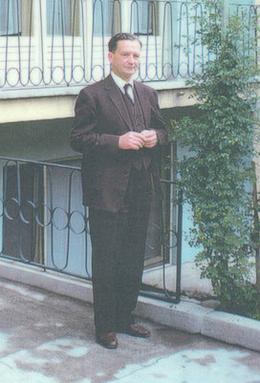
Andrew Colin Renfrew, Baron Renfrew of Kaimsthorn, is a British archaeologist, paleolinguist and Conservative peer noted for his work on radiocarbon dating, the prehistory of languages, archaeogenetics, neuroarchaeology, and the prevention of looting at archaeological sites.

The University of Reading is a public research university in Reading, Berkshire, England. It was founded in 1892 as University College, Reading, a University of Oxford extension college. The institution received the power to grant its own degrees in 1926 by royal charter from King George V and was the only university to receive such a charter between the two world wars. The university is usually categorised as a red brick university, reflecting its original foundation in the 19th century.
Ian Richard Hodder is a British archaeologist and pioneer of postprocessualist theory in archaeology that first took root among his students and in his own work between 1980 and 1990. At this time he had such students as Henrietta Moore, Ajay Pratap, Nandini Rao, Mike Parker Pearson, Paul Lane, John Muke, Sheena Crawford, Nick Merriman, Michael Shanks and Christopher Tilley. As of 2002, he is Dunlevie Family Professor of Anthropology at Stanford University in the United States.

UCL's Institute of Archaeology is an academic department of the Social & Historical Sciences Faculty of University College London (UCL) which it joined in 1986 having previously been a school of the University of London. It is currently one of the largest centres for the study of archaeology, cultural heritage and museum studies in the world, with over 100 members of staff and 600 students housed in a 1950s building on the north side of Gordon Square in the Bloomsbury area of Central London.
Jonathan Mark Kenoyer is an American archaeologist and George F. Dales Jr. & Barbara A. Dales Professor of Anthropology at the University of Wisconsin–Madison. He earned his Bachelor of Arts, Master's, and Doctorate degrees at the University of California, Berkeley, finishing in 1983. Kenoyer is president of the Society of Bead Researchers.
Michael Gordon Fulford, is a British archaeologist and academic, specialising in the British Iron Age, Roman Britain and landscape archaeology. He has been Professor of Archaeology at the University of Reading since 1993.
The McDonald Institute for Archaeological Research is a research institute of the University of Cambridge in England.
The British Institute for the Study of Iraq (BISI) is the only body in Britain devoted to research into the ancient civilizations and languages of Mesopotamia. It was founded in 1932 and its aims are to support and undertake research into the archaeology of Iraq and the neighbouring countries from the earliest times to c. AD 1700, and to promote the cultural heritage of Iraq. The School publishes the refereed annual journal Iraq.
Beycesultan is an archaeological site in western Anatolia, located about 5 km southwest of the modern-day city of Çivril in the Denizli Province of Turkey. It lies in a bend of an old tributary of Büyük Menderes River.

The ancient temple-complex, perhaps of Huzirina, now represented by the tell of Sultantepe, is a Late Assyrian archeological site at the edge of the Neo-Assyrian empire, now in Şanlıurfa Province, Turkey. Sultantepe is about 15 kilometres (9.3 mi) south of Urfa on the road to Harran. The modern village of Sultantepe Köyü lies at the base of the tell.

Winifred Lamb was a British archaeologist, art historian, and museum curator who specialised in Greek, Roman, and Anatolian cultures and artefacts. The bulk of her career was spent as the honorary keeper (curator) of Greek antiquities at the University of Cambridge's Fitzwilliam Museum from 1920 to 1958, and the Fitzwilliam Museum states that she was a "generous benefactor ... raising the profile of the collections through groundbreaking research, acquisitions and publications."
Cyprian Broodbank, is a British archaeologist and academic. Since October 2014, he has been Disney Professor of Archaeology at the University of Cambridge and director of the McDonald Institute for Archaeological Research. From 2010 to 2014, he was Professor of Mediterranean Archaeology at University College London.

The British Institute at Ankara (BIAA), formerly British Institute of Archaeology at Ankara, is a research institute that supports, promotes, and publishes research into the humanities and social sciences of Turkey and the Black Sea region. The institute was founded in 1947 and became legally incorporated in 1956 as part of a cultural agreement between the Republic of Turkey and the United Kingdom. The institute is a UK registered charity and part of the British Academy's Overseas Institutes. The institute has an office in based in Ankara, where it maintains a library, research facilities, and accommodation for visiting scholars. It also has a London office.
Nicoletta Momigliano is an archaeologist specialising in Minoan Crete and its modern reception.

Andrew Michael Burnett, is a British numismatist and museum curator, who specialises in Roman coins. He was Deputy Director of the British Museum from 2003 to 2013, and Keeper of its Department of Coins and Medals from 1992 to 2003. He was president of the Royal Numismatic Society from 2013 to 2018.
Lisa-Marie Shillito is a British archaeologist and senior lecturer in landscape archaeology as well as director of the Wolfson Archaeology Laboratory and Earthslides at Newcastle University. Her practical work focuses on using soil micromorphology, phytolith analysis and geochemistry in order to understand human behaviour and landscape change. Her work includes the Neolithic settlements of Çatalhöyük in Turkey and Ness of Brodgar and Durrington Walls in Britain, but also Crusader castles and medieval settlements in Poland and the Baltic and in the Near East.

Michael Richard Edward Gough was a British archaeologist and the third Director of the British Institute of Archaeology at Ankara (1961-1968). As Director of the BIAA Gough pioneered the archaeology of early Christian sites in Turkey in anticipation of changes in academic viewpoints which were to follow in the 1990s.

Wendy Matthews is a British archaeologist and academic, specialising in Neolithic and Bronze Age Near Eastern archaeology and Geoarchaeology. She is an associate professor at the University of Reading since October 2000.
Naoíse Mac Sweeney is a classical archaeologist and ancient historian. Since 2020 she has been Professor of Classical Archaeology in the Institute of Classical Archaeology at the University of Vienna.
Lutgarde Vandeput is the Director of the British Institute at Ankara.









